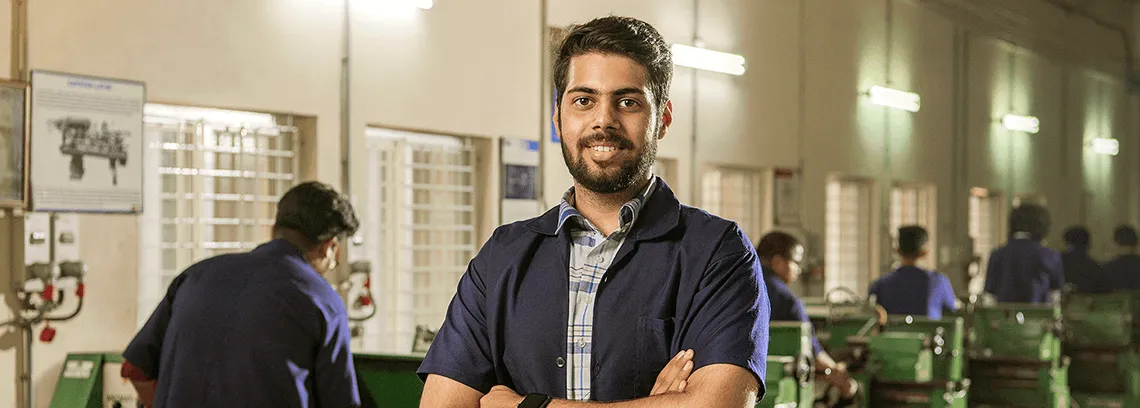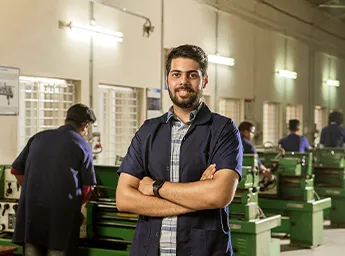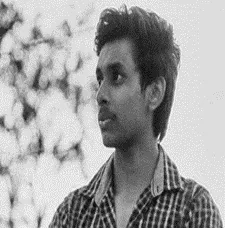Ph.D. Mechanical Engineering
The PhD programme in Mechanical Engineering is designed to empower students with advanced knowledge and the tools necessary to delve into specialised research areas. This programme provides a platform for graduates to explore their area of interest within the broader discipline of Mechanical Engineering, whether it be thermodynamics, fluid mechanics, materials science, or robotics. Students are supported by a rigorous curriculum and state-of-the-art facilities, allowing them to develop innovative solutions to real-world engineering problems.
With a strong emphasis on research, this PhD course enables students to contribute to cutting-edge advancements in Mechanical Engineering. The programme encourages interdisciplinary collaboration and practical application of theoretical principles, preparing students for academic, industrial, and research careers. By focusing on emerging technologies and modern engineering challenges, graduates are equipped to take on leadership roles in various sectors, including manufacturing, automotive, energy, and aerospace industries.

Eligibility
Applicants must hold a Master's degree (MTech or ME) in a relevant engineering field. Additionally, they must possess a Bachelor's degree (BE or BTech) in any of the following engineering disciplines:
Mechanical, Production, Industrial, Automobile, Marine, Aerospace, or Metallurgy, or an equivalent degree.
Scope of the Programme
The scope of the PhD programme in Mechanical Engineering is vast, catering to the need for specialised knowledge in rapidly evolving areas of engineering. Students can engage in advanced research topics such as computational mechanics, energy systems, advanced materials, robotics, and manufacturing technologies. This programme encourages interdisciplinary collaboration, allowing students to apply theoretical principles to practical challenges in fields like aerospace, automotive engineering, renewable energy, and biotechnology. With the growing need for sustainable engineering solutions, students can contribute significantly to future technological innovations.
Moreover, the programme equips graduates with critical problem-solving skills and research expertise, making them suitable for careers in academia, industrial research, and leadership roles in engineering firms. The flexibility to choose their area of specialisation ensures that graduates are not only highly knowledgeable in Mechanical Engineering but also capable of influencing modern engineering practices through innovation and research.
Key Highlights
Application Domain Experience of Faculty
- Sustainable Engineering
- Engine coolants & solar thermal fluids
- Nano Materials for Engineering Applications
- Digital Manufacturing
- Solar Thermal Energy
- 3D printing
Infrastructure
- Digital Manufacturing Lab
- Material Testing Lab
- Sustainable Energy Lab
- Harvard Style Classroom
Research Centre
- MURTI Multidisciplinary Research
- 3D Printing Design Lab
Liberal Education Model
- 24 Credits can be earned across different Schools
- Business
- Humanities
- Sciences
- Architecture
Industry & Academic Collaborations
- Cheongju University, Republic of Korea
- Esco RTS Co. Ltd
- L&T
- Skyroot Aerospace
Venture Development Centre
- Offers a mandatory 02-credit venture development course, encouraging students to develop innovative products and services with real business potential.
Syllabus
Standard Track offerings of courses
- Automotive Engineering
- Digital Manufacturing
- Regular Mechanical Engineering
Specialisation Bundles of Courses offered
- AI & ML for Autonomous Vehicles
- Thermal Engineering
- Industrial Engineering
- Design for Manufacturing
- Smart Manufacturing
Career Options
Pursuing a career in mechanical engineering opens a plethora of opportunities in various sectors in India. With the country's expanding industrial landscape, the demand for mechanical engineers is projected to rise significantly. Engineering is the largest industrial sector in India accounting for 3.53% of the country's GDP, indicating the same as a robust market for professionals in this field . The mechanical engineering sector's growth is driven by advancements in technology and increasing investments in manufacturing, automotive, aerospace, and renewable energy sectors.
Graduates from this programme can pursue careers in various sectors such as:
- Design Engineer
- Production Engineer
- Maintenance Engineer
- Research and Development Engineer
- Project Engineer
- Quality Control Engineer
- Manufacturing Engineer
- HVAC Engineer
- Automotive Engineer
- Robotics Engineer
Star Recruiters



Technology Exploration and Product Engineering (TEPE)
Discover the Technology Exploration and Product Engineering (TEPE) Centre at GITAM, where students turn ideas into prototypes through hands-on learning, frugal innovation, and interdisciplinary collaboration. Build real-world skills with advanced tools like 3D printers and IoT kits.
Notable Alumni
Infrastructure and Facilities
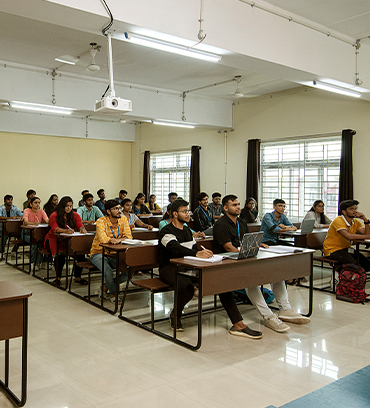


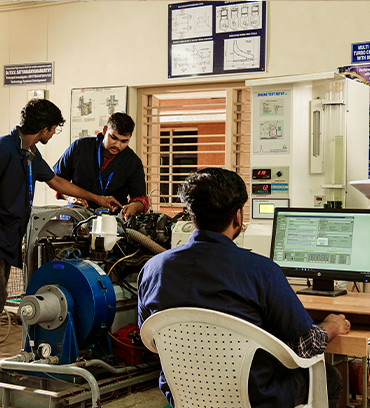



Fee Structure
Ph.D. Mechanical Engineering
| PhD Mode of Admission | Duration | Application Fee | Annual Fee | Processing Fee (Only one time) |
|---|---|---|---|---|
| Full-Time (Indian Nationals) | 3 Years | INR 1,200 | INR 30,000 | NIL |
| Full-Time (Foreign Nationals) | 3 Years | NIL | USD 2,500 | USD 300 |
| Extramural | 4 Years | INR 1,200 | INR 1,00,000 | NIL |




